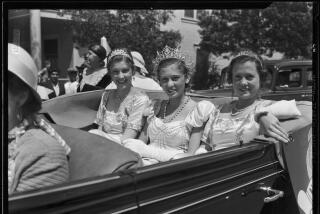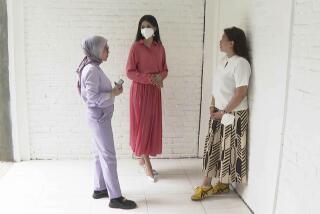Final Round Turned Into ‘Tea Party’ : Beijing Beauty Contest Trips on Ideology
- Share via
BEIJING — A pretty young woman in a short black skirt, white sweater and a damp, olive-drab jacket entered the lobby of a cultural center Sunday evening, removed a towel from her handbag and dried her rain-splattered legs.
Blithely ignoring everyone around her, she delicately balanced on one leg and pulled on a stocking, shifted and put on the other, then headed into the final event of Beijing’s first beauty contest since the 1949 Communist revolution.
The Beijing contest was announced in April as an attempt to educate young women about concepts of beauty, skilled use of cosmetics and improved standards of decorum in a society where, until a few years ago, any attempt to look pretty was virtually counterrevolutionary.
Ideological Opposition
But after provoking a wave of more flashy beauty contests across the country--and plans for a Shanghai event that were announced and then canceled--Beijing’s competition ran into ideological opposition that forced it to end prematurely Sunday with a low-key “tea party.”
Out of 860 original contestants, about 50 young women who participated in early rounds and apparently would have been finalists were invited to Sunday’s party, at which they shared their thoughts about beauty in brief speeches. Foreign reporters were barred from the event, and Chinese reporters were not officially invited.
Some young women who were interviewed after leaving the building said they enjoyed the evening. But there was an undercurrent of gloom to the party, for the contest had illustrated not only China’s movement toward a more ideologically relaxed society, but also the fitfulness of progress in that direction.
‘Still So Backward’
“This happened because China is still so backward,” commented Yang Qiuyi, an 18-year-old freshman at the Beijing Film Institute. Yang headed a list of 12 young women honored with certificates at Sunday’s event, and thus apparently would have had a good chance of winning fame as Beijing’s beauty queen had the contest proceeded as planned.
“I was very disappointed,” said Yang, a tall, thin and beautiful young woman who wore large, dangling earrings and a stylish but casual pantsuit made of material resembling artificially faded blue jeans. “No one expected it to end this way.”
Zhu Hansheng, deputy editor in chief of the magazine Contemporary Television, who was head organizer of the contest, said in an interview before Sunday’s party that a nationwide rash of beauty contests stressing only physical beauty and offering big prizes had led to the cancellation of plans for the final round of Beijing’s competition.
Zhu said Beijing’s beauty contest--officially referred to as a “contest of youth and elegance”--was meant to differ from such Western-style beauty contests.
Internal, External Beauty
“Young women in China are all seeking beauty, but they aren’t clear about what beauty really is,” Zhu explained. “We want to promote internal as well as external beauty.”
The Beijing contest thus included workshops at which experts discussed concepts of beauty and gave lessons in such subjects as restrained use of cosmetics and how to walk with elegance.
“Firstly, we stressed the unity of internal and external beauty,” Zhu said. “Secondly, it wasn’t a competition for prizes. And thirdly, our whole process involved education about beauty.”
But to many observers, it still looked like a beauty contest.
And for the past two weeks, it was rumored that the event had been criticized by the Communist Party’s Propaganda Department, by the relatively young and reformist Politburo Standing Committee member Hu Qili, or by more elderly leaders who prompted Hu or the Propaganda Department to take action to force its cancellation.
No Such Order
“I haven’t directly received any such order,” Zhu said when asked about such rumors. He insisted that the organizers had themselves made the decision to revise their plans.
“When we saw the overall situation, we changed our minds,” he said.
The decision prompted anguish among some contestants.
“At the beginning of this contest, I was very enthusiastic,” commented one of the participants during her speech, according to one of the people present. “Then I got a note from the organizers that the situation had changed, and I was very disappointed.”
Shortly after that, she said, her superior at work told her to drop out of the contest. The woman, who apparently defied her boss to come to the party, then broke into tears.
“I don’t want to cry,” she added before sitting down. “But I can’t help it.”
More to Read
Sign up for Essential California
The most important California stories and recommendations in your inbox every morning.
You may occasionally receive promotional content from the Los Angeles Times.










